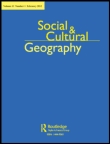
SOCIAL & CULTURAL GEOGRAPHY
metrics 2024
Innovating research at the crossroads of culture and geography.
Introduction
SOCIAL & CULTURAL GEOGRAPHY, published by Routledge Journals, Taylor & Francis Ltd, stands as a leading platform for innovative research in the fields of cultural studies and geography. With an impressive impact factor reflected in its Q1 ranking in both Cultural Studies and Geography, Planning and Development categories, this journal houses high-quality articles and theoretical frameworks that shape contemporary discussions in social and cultural geography. Its rigorous indexing, including a commendable Scopus Rank—#20 out of 1304 in Cultural Studies—underscores its significance and influence in the academic community. Operating since 2000 and continuing to thrive until 2024, SOCIAL & CULTURAL GEOGRAPHY promotes interdisciplinary dialogues while fostering a deeper understanding of the intricate relationships between society and space. We encourage researchers, professionals, and students to engage with resourceful insights and critical perspectives published in this pivotal journal, thereby contributing to the evolving landscape of geographical thought.
Metrics 2024
 1.08
1.08 2.40
2.40 2.60
2.60 91
91Metrics History
Rank 2024
Scopus
IF (Web Of Science)
JCI (Web Of Science)
Quartile History
Similar Journals
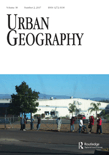
URBAN GEOGRAPHY
Advancing Insights in Urban StudiesURBAN GEOGRAPHY, published by Routledge Journals, Taylor & Francis Ltd, is a leading interdisciplinary journal that has been at the forefront of urban studies since its inception in 1980. With an impact factor that positions it in the prestigious Q1 category in both Geography, Planning and Development and Urban Studies, this journal is recognized for its rigorous research that informs policy and practice in urban environments. With a Scopus ranking of #20 out of 279 in the field of Urban Studies and #79 out of 821 in Geography, Planning and Development, it offers valuable insights for scholars, professionals, and students alike—enhancing our understanding of the complex dynamics that shape urban spaces. URBAN GEOGRAPHY is pivotal for those looking to advance their expertise in urban analytical frameworks, urbanization trends, and sustainable development strategies. Submissions are welcomed from a diverse range of perspectives, making it a vital resource for anyone invested in the future of urban landscapes.

GEOGRAFICKY CASOPIS-Geographical Journal
Charting new territories in geography and earth sciences.GEOGRAFICKY CASOPIS-Geographical Journal is a prestigious publication dedicated to advancing knowledge in the fields of geography and earth sciences, published by the SLOVAK ACADEMY OF SCIENCES, INSTITUTE OF GEOGRAPHY. With a rich history dating back to its inception in 1976, the journal serves as a vital forum for researchers and professionals to disseminate their findings across a range of topics including earth-surface processes, geography, planning, development, and geology. Notably, it maintains a respectable Q3 category ranking across these disciplines as of 2023, indicating its contribution to relevant academic discourse. The journal is indexed under critical databases and engages a global audience, making it an essential resource for scholars seeking to stay informed about contemporary issues and advancements in geography. Although currently not an open-access journal, it emphasizes the sharing of significant research findings and encourages submissions from various geographical contexts to enrich the scientific community. Geographical Journal's commitment to fostering interdisciplinary dialogue ensures its relevance and importance in shaping the future of geographical research.

Gender Place and Culture
Catalyzing Conversations on Gender, Culture, and PlaceGender, Place and Culture is a leading international journal published by Routledge Journals, Taylor & Francis Ltd, dedicated to advancing knowledge and understanding in the fields of Gender Studies, Cultural Studies, and related disciplines. Since its inception in 1994, this esteemed publication has become a critical resource for researchers, professionals, and students seeking to explore the intricate relationships between gender, identity, and spatial dynamics. With a commendable impact factor and prestigious rankings placing it in the Q1 quartile for Arts and Humanities (miscellaneous), Cultural Studies, and Gender Studies, the journal not only underscores its significance within academia but also reflects its commitment to high-quality scholarship. The editorial team actively promotes rigorous research that addresses contemporary societal issues, fostering an inclusive scholarly discourse. Researchers interested in contributing to this dynamic field will find Gender, Place and Culture an invaluable platform for sharing innovative ideas and findings, contributing to the ongoing conversation around the complex interplay of gender and space.
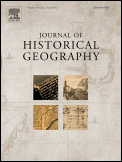
JOURNAL OF HISTORICAL GEOGRAPHY
Uncovering the Layers of Our Historical LandscapesWelcome to the Journal of Historical Geography, an esteemed publication dedicated to enriching the fields of archaeology, geography, and history through innovative research and critical discourse. Published by Academic Press Ltd - Elsevier Science Ltd, this journal has been a cornerstone of interdisciplinary scholarship since its inception in 1975, now extending its coverage through 2024. With an impressive Scopus ranking that places it in the top quartile for history and strong standings in archaeology and geography, this journal offers insightful analyses that are crucial for understanding spatial dynamics over time. Researchers and professionals alike value its commitment to accessibility and rigor, making it an essential resource for academics engaged in the study and teaching of historical geography. Although the journal operates under subscription access options, its contributions undoubtedly enrich scholarly dialogue and foster a deeper understanding of our historical landscapes.
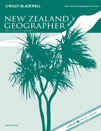
New Zealand Geographer
Unveiling Insights into Global and Regional GeographiesNew Zealand Geographer, published by WILEY, is a distinguished academic journal that has made significant contributions to the fields of geography, planning, and earth sciences since its inception in 1945. With a dedication to advancing knowledge through rigorous research and critical analysis, the journal encompasses a broad spectrum of topics relevant to both regional and global geographies. This journal is currently indexed in Scopus, achieving commendable rankings in multiple categories, including a Q3 status in both Earth and Planetary Sciences and Geography, Planning and Development for 2023, highlighting its relevance and standing within the academic community. Although it does not currently offer open access, its commitment to providing insightful and impactful content ensures that it remains a vital resource for researchers, professionals, and students alike seeking to deepen their understanding of geographical phenomena. The journal's ongoing publication until 2024 continues to foster scholarly discourse, making it an essential platform for innovative research in geographic studies.

Emotions and Society
Advancing insights into emotional landscapes of society.Emotions and Society is an esteemed journal published by Bristol University Press & Policy Press, dedicated to advancing the understanding of emotional dynamics within social contexts. With an ISSN of 2631-6897 and E-ISSN 2631-6900, this journal, headquartered in the United Kingdom, serves as a vital platform for researchers and scholars interested in the intersections of cultural studies, sociology, and psychology. Since its inception in 2019, Emotions and Society has achieved remarkable recognition, achieving a prestigious Q1 ranking in Cultural Studies and consistently engaging a diverse audience with a focus on emotional expressions and their societal implications. The journal is committed to open dialogue and innovative research that illuminate how emotions shape individuals and societies both within and across cultural boundaries. With an expanding readership and a dedication to high-quality academic discourse, it is positioned as a key resource for professionals and students alike. For those passionate about exploring the profound nuances of emotions in various social settings, Emotions and Society offers a rich repository of insights and scholarship.

Biblio 3W-Barcelona
Fostering scholarly communication in information science.Biblio 3W-Barcelona is a prominent academic journal published by the Universitat de Barcelona, Servei Publicacions, focusing on the dynamic field of library and information science. Established to foster scholarly communication, this journal provides a platform for researchers, professionals, and students dedicated to the advancement of bibliographic studies and library management. Despite lacking a current impact factor, Biblio 3W-Barcelona is recognized for its commitment to high-quality research and its contribution to the field, making it a valuable resource for those engaged in understanding the complexities of information dissemination in modern society. The journal features original research articles, critical reviews, and case studies that invite varied perspectives within the realm of librarianship. Readers can access its comprehensive body of work freely, enriching their knowledge and fostering practical applications in library science. For submission guidelines and further information, visit their website.
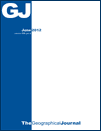
GEOGRAPHICAL JOURNAL
Pioneering research that shapes our understanding of the planet.Geographical Journal, published by Wiley, is a leading scholarly resource dedicated to advancing the field of geography and earth-surface processes. With an established history dating back to 1973, this prestigious journal thrives on disseminating high-quality research, featuring a robust archive that encompasses critical insights from various geographical and environmental studies. As evidenced by its impressive Q1 rankings in both Earth-Surface Processes and Geography, Planning and Development, the journal stands out in its commitment to impact and relevance in the academic community. Although not Open Access, the journal provides researchers, professionals, and students with invaluable peer-reviewed articles essential for understanding complex geographical phenomena. Whether you are focused on socio-environmental interactions or earth sustainability, Geographical Journal serves as a cornerstone for innovative research, fostering knowledge that shapes policy and practice.
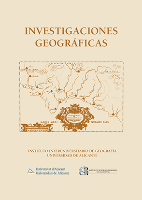
Investigaciones Geograficas-Spain
Empowering scholars to tackle pressing environmental challenges.Investigaciones Geográficas-Spain is an esteemed academic journal published by the Universidad de Alicante, dedicated to advancing the fields of geography, planning, and development as well as earth and planetary sciences. With its commitment to open access since 1983, the journal ensures that research is readily available to a global audience, facilitating knowledge dissemination and collaborative discourse. As reflected in its 2023 Scopus rankings, it holds a commendable position within the Q3 category in both Earth and Planetary Sciences and Geography, Planning and Development, making it a noteworthy resource for scholars and practitioners in these disciplines. The journal's scope encompasses diverse geographical research, aiming to address pressing environmental and societal challenges through empirical studies and theoretical advancements. By contributing to the knowledge reservoir from Spain and beyond, Investigaciones Geográficas-Spain serves as a vital platform for researchers, professionals, and students seeking to enrich their understanding of geographical phenomena.

Hrvatski Geografski Glasnik-Croatian Geographical Bulletin
Unveiling Insights into Our Changing WorldHrvatski Geografski Glasnik-Croatian Geographical Bulletin, ISSN 1331-5854, E-ISSN 1848-6401, is an esteemed open-access journal published by the Croatian Geographical Society that has been serving the geography community since 1929. Based in Zagreb, Croatia, this journal focuses on a broad spectrum of geographical research, providing a platform for the dissemination of original articles, reviews, and case studies that contribute to the understanding of earth-surface processes and development planning. Although it currently holds Q4 rankings in both Earth-Surface Processes and Geography, Planning and Development, the journal is dedicated to enhancing its impact within the scientific community, aspiring to elevate research visibility and collaborative opportunities. With a commitment to open access, it ensures that all content is readily available to researchers, professionals, and students worldwide, fostering an inclusive environment for geographical scholarship. Engaging with this journal presents an opportunity to stay updated with emerging trends and pivotal studies within the discipline throughout its converged years from 1998 to 2024, making it a vital resource in geography and related fields.